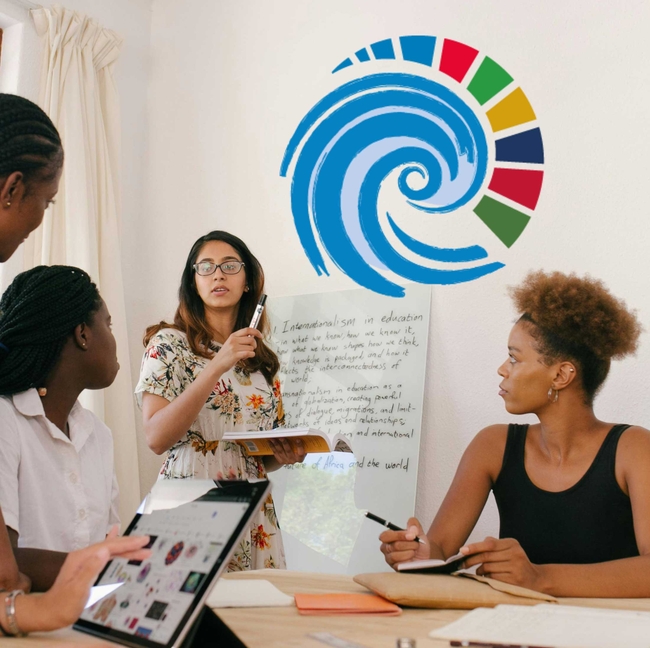Co-design for the Ocean Decade: African Mentoring Programme Empowers Next Generation of Ocean Leaders
The Leibniz Centre for Tropical Marine Research (ZMT) has successfully concluded the African leg of its Co-Designing Decade Actions mentoring programme, implemented with support from UNESCO’s Intergovernmental Oceanographic Commission (IOC). Building on the first phase conducted with Caribbean SIDS, the initiative aimed to strengthen co-design competencies among ocean professionals across Africa. Co-design refers to the process of jointly developing knowledge and solutions between scientists, policymakers, and communities - ensuring that research is both scientifically robust and socially relevant.
By combining training, mentoring, and peer exchange, ZMT sought to address a persistent gap in global capacity development: helping researchers and practitioners transform promising community-based ideas into implementable and potentially endorsed Ocean Decade Actions. These actions are collaborative, solutions-oriented projects officially recognised under the UN Decade of Ocean Science for Sustainable Development (2021–2030) for their contribution to ocean health, resilience, and equity - and for amplifying the global visibility of regional research and innovation.
Julian Lilkendey (ZMT) coordinated the twelve-week virtual course, which combined scientific training with practical tools for collaboration across disciplines and communities - the essence of co-design. Together with an international team of coaches, he guided participants through the full cycle of developing an Ocean Decade Action.
Prof. Merle Sowman (University of Cape Town) opened the series by introducing complex systems thinking and participatory coastal governance, framing co-design as an inclusive method for addressing interconnected social and ecological challenges. Dr. Edem Mahu and Dr. Donatus Yaw Atiglo (both University of Ghana) helped participants turn ideas into shared visions and structured impact pathways, while Olusola Adeoye (Nature Cares Resource Centre, Nigeria) and Dr. Nancy Oduor (ZMT) focused on stakeholder engagement and project management - key to ensuring that diverse partners work toward common goals.
Mimi Kalinda, one of Africa’s leading voices in storytelling and strategic communication, showed how to convey scientific messages with clarity and cultural relevance. The final modules, led by ZMT alumnus Prof. Seth Mensah Abobi (University for Development Studies, Ghana) and Dr. Naya Sena (University of Tokyo, Japan), centred on evaluation and sustainability, helping participants plan for long-term community ownership and real-world impact.
Around fourteen participants from Tunisia, Cabo Verde, Togo, Cameroon, Nigeria, Ghana, and the Seychelles took part in the bi-weekly Zoom sessions. Over the course of six modules, they developed, refined, and consolidated their concepts into implementation-ready, regionally grounded proposals that now stand prepared for submission under the Call for Decade Actions No. 10/2025.
Among the most advanced proposals presented during the final workshop were:

Ocean Decade Information Centres - led by Leila Neves (Cabo Verde), exemplified the programme’s transformative ethos. Linking ocean heritage, education, and youth empowerment, the initiative became a regional blueprint for integrating cultural narratives into ocean literacy. In her closing reflection, she noted:
“The programme made us take a huge leap from the idea to the action - to setting goals and starting to say, well, you know, you can achieve those milestones.”

Discover Brama Community Hub - led by Edna Kobbinah (Ghana). What began as a local clean-up initiative evolved into a community hub combining recycling, sanitation, and livelihood creation. The design now includes a plastic-recycling station and public-health facilities to address plastic pollution and coastal resilience.

Ocean Waste Upcycling for Internally Displaced People and Coastal Community Empowerment - led by Ewube Egbe (Cameroon). This initiative empowers displaced women to convert marine litter into marketable products, integrating livelihood generation with circular-economy principles. Through mentoring, the project gained a measurable stakeholder-engagement plan and a roadmap for expansion.

African Blue Bioeconomy Action Network - developed by Chinomso Onwubiko, Victoria Aghaji Ujunwa, and Anthony Akpan (Nigeria), matured into a collaborative platform connecting universities, private enterprises, and NGOs to advance blue-economy entrepreneurship and training for early-career scientists.

Hydrospatial Analytics for Resilient Marine Observation and Navigation through Innovative Science and Engagement (HARMONiSE) - Francesca Adrienne (Seychelles) introduced a data-driven proposal applying hydrospatial science to strengthen marine observation, navigation, and governance in island contexts. Rooted in local partnerships and digital co-design tools, the project aims to enhance decision-making and resilience across Small Island Developing States. Reflecting on the training, she described it as “a journey of sharpening strategy, strengthening collaboration, and tackling practical ocean challenges.” She added, “The critical thinking fostered during the course, especially around problem definition, evaluation, and long-term impact, aligns closely with the demands of academic work. I am ready to push boundaries, connect theory to practice, and help build a community of ocean leaders ready for the Decade ahead.” Her full reflection is available in Snapshot - Co-Design Training Course for Ocean Decade Actions in Africa.

Bridging Waves ~ West Africa - conceived by Patrice Délagnon (Togo), emerged as a cross-border network linking marine scientists, NGOs, and educators across Togo, Benin, and Ghana. It now includes plans for a regional ocean-literacy repository and youth-training workshops, serving as a model for cooperation along the Gulf of Guinea.
The African cohort’s work demonstrated how mentoring, peer learning, and structured facilitation can accelerate the journey from early ideas to viable, submission-ready proposals. Together with the Caribbean SIDS cohort of 2024, this second regional cycle reflects ZMT’s expanding role as a convener and knowledge broker under the UN Ocean Decade - implemented in partnership with the Ocean Teacher Global Academy (OTGA), the IOC Sub-Commission for the Caribbean and Adjacent Regions (IOCARIBE), the African Ocean Decade Task Force, and Our Shared Ocean. Collectively, these collaborations advance co-design as a foundation for equitable and inclusive ocean solutions.





